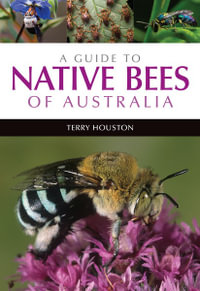
Oak Origins
From Acorns to Species and the Tree of Life
By: Andrew L. Hipp, Rachel D. Davis (Illustrator), Beatrice Chasse (Foreword by)
Hardcover | 11 March 2025 | Edition Number 1
At a Glance
Hardcover
RRP $57.95
$44.25
24%OFF
Available: 11th March 2025
Preorder. Will ship when available.
An oak begins its life with the precarious journey of a pollen grain, then an acorn, then a seedling. A mature tree may shed millions of acorns, but only a handful will grow. One oak may then live 100 years, 250 years, or even 13,000 years. But the long life of an individual is only a part of these trees' story.
With naturalist and leading researcher on the deep history of oaks Andrew L. Hipp as our guide, Oak Origins is a sweeping evolutionary history, stretching back to a population of trees that lived more than fifty million years ago. We travel to ancient tropical Earth to see the ancestors of the oaks evolving in the shadows of the dinosaurs. We journey from the once-warm Arctic forests of the oaks' childhood to the montane cloud forests of Mexico and the broadleaved evergreen forests of southeast Asia. We dive into current research on oak genomes to see how scientists study genes moving between species and how oaks evolve over generations-and tens of millions of years. Finally, we learn how oak evolutionary history shapes the forests we know today, and how it may even shape the forests of the future.
Oaks are familiar to almost everyone and beloved. They are embedded in our mythology. They have fed us, housed us, provided wood for our ships and wine barrels and homes and halls, planked our roads, and kept us warm. Every oak also has the potential to feed thousands of birds, squirrels, and mice, and host countless insects, mosses, fungi, and lichens. But as Oak Origins makes clear, the story of the oaks' evolution is not just the story of one important tree. It is the story of the Tree of Life, connecting all organisms that have ever lived on Earth, from oaks' last common ancestor to us.
Industry Reviews
"Oaks are strong and sturdy, adaptable and beautiful, and the same can be said for Hipp's joyful book Oak Origins. Hipp, director of the herbarium at the Morton Arboretum near Chicago, is a world expert on tree genetics and evolution, and with his new book, proves that he has science writing chops as well. In his meditation on oaks, he uses these familiar trees to explore the wonders of plants, ecosystems, evolution, and Earth history. I grew up amongst the oaks in Illinois. A few huge ones towered over our backyard, but I didn't think much of them until one was felled by lightning, and all of a sudden, our home was less vibrant with birds and insects. After reading Hipp's book, I understand why: oaks are the nexus of a hidden world of diversity and beauty, which we must preserve as climates and environments change rapidly around us." -- Steve Brusatte, professor and paleontologist at the University of Edinburgh and New York Times-bestselling author of "The Rise and Fall of the Dinosaurs"
"In this brilliant exploration, oaks emerge as jazz musicians, continually improvising, collaborating, and finding new living music over millions of years. We think of oaks as hard and unyielding, but Hipp's compelling writing reveals them as supple and inventive, from genes, to physiology, to their ecologies." -- David George Haskell, William R. Kenan Jr. Professor of Biology, Sewanee: The University of the South, and the author of "Sounds Wild and Broken," "The Songs of Trees," and "The Forest Unseen"
"Elegantly written and authoritatively researched, this book takes us around the world and down into the archives of deep time-from Oaxaca to Wuyishan, from the Norse World-Tree to the Darwinian Tree of Life-exploring the surprisingly rich, diverse, and ancient botanical world that has sprung forth from the humble acorn." -- Robert Moor, New York Times-bestselling author of "On Trails: An Exploration"
"Oak Origins: From Acorns to Species and the Tree of Life is a captivating combination of oak natural history and evolutionary biology. A must read for anyone interested in oaks or biodiversity science." -- Jonathan B. Losos, author of "The Cat's Meow" and "Improbable Destinies"
"Oak Origins: From Acorns to Species and the Tree of Life is an essential read for anyone attempting to understand the fundamental but truly complex biology of the oaks. The volume provides a clear analysis of the diversity of oaks, oak hybridization, oak communities, the oak genome, and the impressive global radiation and distribution of the oaks." -- Michael A. Steele, Department of Biology, Wilkes University, and author of "Oak Seed Dispersal: A Study in Plant-Animal Interactions"
"One of the premier naturalists and evolutionary biologists of our time, Hipp weaves together the deeply compelling origin story of the oaks-at once scientifically rigorous and accessible to all. Hipp pieces together botanical details of reproductive biology with the complex science of gene evolution, fossil data, and ecological observations to bring to life the incredible story of the northern hemisphere's most adored and important tree genus. A literary accomplishment, illustrated with exquisite botanical drawings, Oak Origins will give the reader a profound appreciation of how the trees around us came to be here in such abundance. I recommend this book to anyone who has ever picked up an acorn and wondered how it could one day become one of the most iconic and revered standing giants in our midst." -- Jeannine Cavender-Bares, director, Harvard University Herbaria
"There is poetry, suspense, and humor in Andrew's science, and in his writing. You can enter his story in many different ways, but, once you are in it, you will be captivated." -- Beatrice Chasse, former president of the International Oak Society, from the foreword
ISBN: 9780226823577
ISBN-10: 0226823571
Available: 11th March 2025
Format: Hardcover
Language: English
Number of Pages: 288
Audience: General Adult
Publisher: The University of Chicago Press
Country of Publication: GB
Edition Number: 1
Dimensions (cm): 22.86 x 15.24 x 3.04
Weight (kg): 0.59
Shipping
| Standard Shipping | Express Shipping | |
|---|---|---|
| Metro postcodes: | $9.99 | $14.95 |
| Regional postcodes: | $9.99 | $14.95 |
| Rural postcodes: | $9.99 | $14.95 |
How to return your order
At Booktopia, we offer hassle-free returns in accordance with our returns policy. If you wish to return an item, please get in touch with Booktopia Customer Care.
Additional postage charges may be applicable.
Defective items
If there is a problem with any of the items received for your order then the Booktopia Customer Care team is ready to assist you.
For more info please visit our Help Centre.























